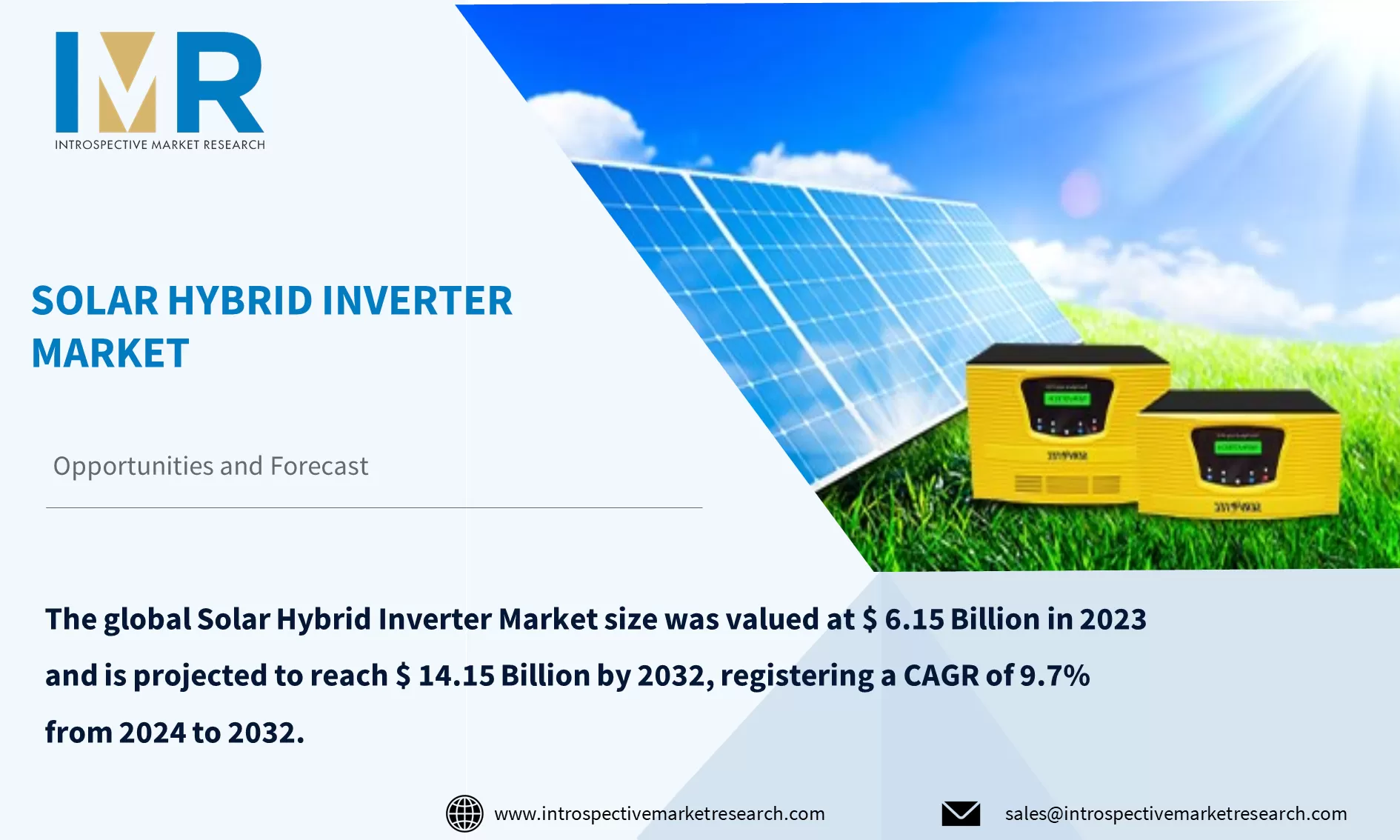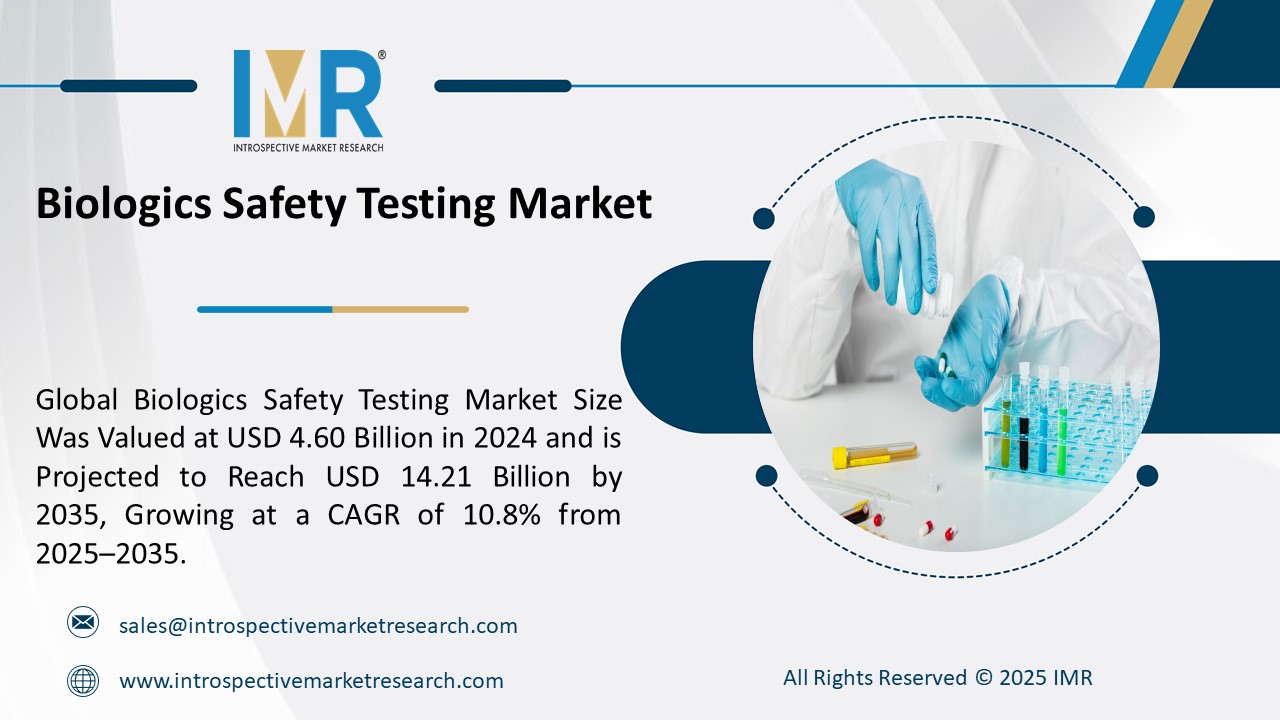Solar Hybrid Inverter Market
According to a new report published by Introspective Market Research, titled, ?Solar Hybrid Inverter Market by Product, Applications, Global Market Analysis and Forecast, 2024-2032.
The global Solar Hybrid Inverter Market size was valued at $ 6.15 Billion in 2023 and is projected to reach $ 14.15 Billion by 2032, registering a CAGR of 9.7% from 2024 to 2032.
The solar hybrid inverter market is a segment of the renewable energy industry that converts solar power into usable electricity for residential and commercial use. It integrates with conventional power sources like the grid or backup generators. These inverters combine solar inverters' functionality with battery storage and grid connectivity, optimizing energy usage by managing electricity flow between solar panels, batteries, and the grid. This offers consumers greater energy independence, reliability, and potential cost savings by maximizing the self-consumption of solar-generated electricity.
The solar hybrid inverter market is rapidly expanding globally due to the growing demand for renewable energy solutions and effective control of solar power systems. These inverters are essential parts of power utilities, integrating solar energy into conventional utilities and forming an integral part of sustainable energy infrastructure. Advancements in technology and government policies contribute to the market growth, as they improve compatibility, durability, and efficiency when used with power sources like solar, grid, and battery. Remote monitoring and control features enhance user experience and allow for fault prediction before they cause significant system failure.
Competition among stakeholders is driving new product developments and partnerships, with manufacturers aiming to create products and services that meet customer needs at a low cost. Cooperation with solar panel producers, energy storage system vendors, and utility companies also helps integrate solar hybrid inverters into total energy control systems. The solar hybrid inverter market is expected to experience a rising trend in offerings in the coming years due to technological advancements, better awareness, and favorable government policies.
According to Solar Hybrid Inverter, the Market is segmented into process, Product, Application, and region. By Product, the market is categorized into Single-Phase Hybrid and Three-Phase Hybrid. By Applications, the market is categorized into Commercial, Residential, and Others. By region, it is analyzed across North America (U.S.; Canada; Mexico), Europe (Germany; U.K.; France; Italy; Russia; Spain, etc.), Asia-Pacific (China; India; Japan; Southeast Asia, etc.), South America (Brazil; Argentina, etc.), Middle East & Africa (Saudi Arabia; South Africa, etc.).
The global search for renewable energy sources, particularly solar energy, is driven by environmental concerns and climate change. Governments are offering subsidies, tax credits, and aerobic targets to encourage solar energy use. This has led to increased use of solar power in homes, businesses, and industries. Hybrid inverters, which interface distributed solar power with conventional grid systems, provide energy security and minimize overreliance on fossil fuels. Solar energy also offers economic returns, as it offers a cheaper method of producing electricity and improved efficiency in critical businesses like healthcare facilities, telecommunication, and emergency response centers. The market for hybrid inverters is growing worldwide due to its cost-effectiveness and operational efficiency.
The solar hybrid inverter market is influenced by technology, with manufacturers investing in research to improve functionality and credibility. They aim to achieve higher conversion efficiencies and optimize solar energy use. Integrating power electronics and semiconductor technologies enhances photovoltaic system efficiency. New energy industry developments focus on improving grid stability and monitoring features, addressing the challenge of asynchronous interconnection of parallel power systems. Advanced grid management algorithms and control tactics ensure proper interfacing between renewable energy systems and grids while enhancing monitoring and control for optimal energy generation and usage.
Global Solar Hybrid Inverter Market Segmentation
The Solar Hybrid Inverter Market is segmented based on Product, Applications, and Region.
Product:
The Single-Phase Hybrid segment is expected to dominate the market during the forecast period. Single-phase hybrid inverters are primarily used in home solar systems, generating lower power outputs suitable for single homes and local requirements. They are popular due to their affordability and ease of installation, making them a popular choice for homeowners seeking renewable energy sources. These inverters control power between solar modules, battery storage systems, and household circuits, allowing homeowners to make the most of clean electricity without relying on neighboring power. The trend towards single-phase hybrid inverters is driven by their simplicity, low initial investment, and quick installation of infrastructure. Additionally, continuous maintenance and operation are easy, making them a popular choice for homeowners. With their user-friendliness, financial, and environmental advantages, single-phase hybrid inverters can confidently claim dominance in the residential market.
Applications:
commercial segment held the largest share in 2023.
The commercial segment dominates the hybrid inverter market due to its significant energy demands. Three-phase hybrid inverters are ideal for handling high power loads and providing stable electricity, essential for large commercial facilities and manufacturing plants. They integrate seamlessly with large photovoltaic systems and battery storage solutions, reducing dependence on the grid and lowering energy costs. The adoption of hybrid inverters in the commercial sector is driven by the need to reduce costs, enhance energy security, and comply with sustainability goals. Businesses benefit from economies of scale and the integration of renewable energy sources, improving their corporate image and compliance with environmental regulations.
Region:
Asia Pacific is expected to dominate the market during the forecast period. The solar hybrid inverter market in the Asia-Pacific region is expected to grow significantly due to China and India's government initiatives and favorable policies. China's commitment to reducing carbon emissions and promoting renewable energy projects has led to significant investments in solar energy infrastructure, including advanced inverters. India's ambitious renewable energy targets and rural electrification initiatives, such as the Jawaharlal Nehru National Solar Mission, have also fueled the adoption of solar hybrid inverters. The combination of high solar irradiance, decreasing costs of solar technology, and supportive policies position India as a critical market for solar hybrid inverter growth.
Some of The Leading/Active Market Players Are-
- Flin Energy
- Luminous India
- Microtek Inverters
- Schneider Electric
- Su-Kam Power Systems
- Delta Energy Systems
- EAST Group
- Kaco New Energy
- Pure Volt
- Tabuchi Electric and Other Active Players.
Key Industry Developments
- In April 2024, Menlo Electric, the fastest-growing solar component distributor in EMEA, signed a strategic cooperation agreement with Deye, a leading manufacturer of residential and C&I energy storage solutions. This partnership marks a significant milestone in Deye?s expansion, leveraging Menlo Electric?s extensive distribution channels. Both companies are committed to addressing the energy shortage in the Middle East and Africa by delivering advanced solar photovoltaic solutions. Demonstrating their dedication, they have pledged a volume of 100+MW to enhance their presence in the region by the end of 2023.
- In December 2023, Deye announced a partnership with RedEarth following the successful testing of Deye's advanced hybrid inverter range with RedEarth's Private Power Plant (PPP) software, which maximizes financial returns for Australian end users through dynamic energy management. RedEarth has also certified their popular Troppo battery for use with Deye LV inverters. Now, RedEarth offers a range of all-in-one BESS systems featuring the Deye inverter and Troppo battery, available for sale in Australia and the South Pacific, and fully compatible with RedEarth?s PPP platform.
Key Findings of the Study
- The Single-Phase Hybrid inverter segment is expected to dominate the market, driven by its popularity in residential applications due to affordability, ease of installation, and operational simplicity.
- The commercial segment held the largest market share in 2023, driven by high energy demands in commercial facilities. Three-phase hybrid inverters are preferred for their ability to handle large power loads effectively.
- Asia Pacific is anticipated to dominate the market, fueled by government initiatives in countries like China and India promoting solar energy infrastructure and favorable policies supporting renewable energy adoption.






